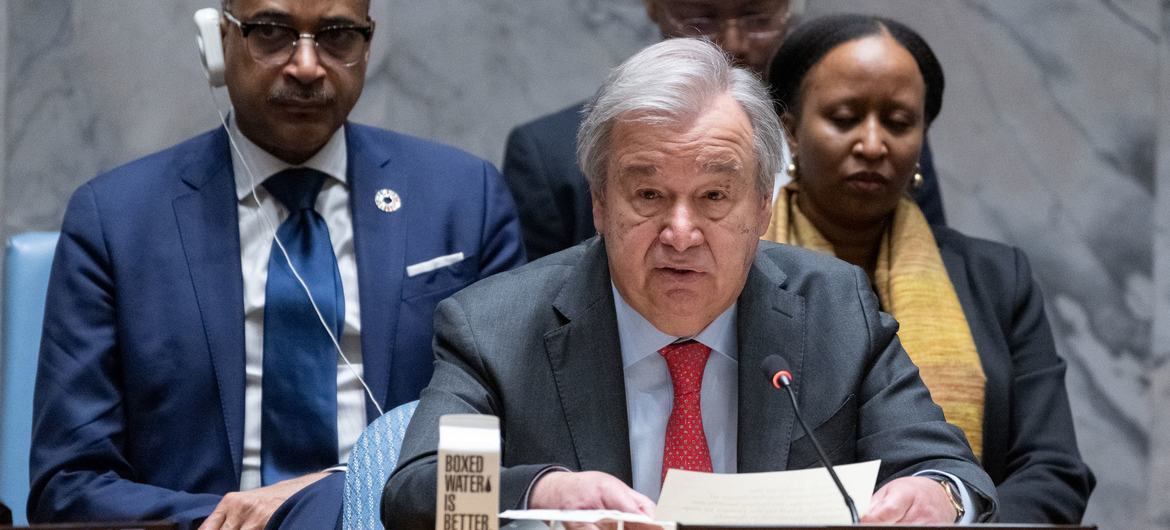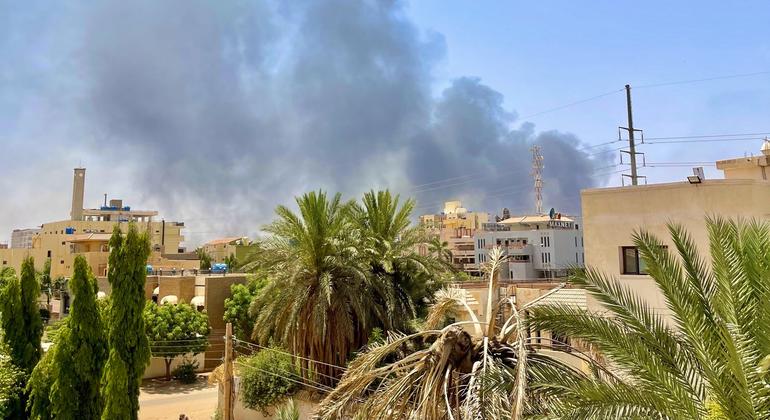Speaking in the UN Security Council, António Guterres said: “Let me be clear: the United Nations is not leaving Sudan. Our commitment is to the Sudanese people, in support of their wishes for a peaceful and secure future. We stand with them, at this terrible time.”
In blunt terms, he said the violence must stop, now. “It risks a catastrophic conflagration within Sudan, that could engulf the whole region and beyond.”

Secretary-General António Guterres addresses the Security Council meeting on Maintenance of international peace and security.
In a statement issued earlier by his Spokesperson, António Guterres said the relocation exercise had been carried out “without incident”, adding that he appreciated the cooperation shown by Sudanese army personnel and paramilitaries from the Rapid Support Forces (RSF), allowing safe passage to Port Sudan, on the Red Sea.
“The Secretary-General reiterates his call on the parties to immediately cease hostilities and allow all civilians to evacuate from areas affected by the fighting.”
Mr. Guterres affirmed “the continued dedication” of the whole UN system, “to stand with, and work for, the Sudanese people, in support of their wishes for a peaceful, secure future and a return to the democratic transition.”
The warring factions had worked together since the ousting of long-term ruler Omar al-Bashir, four years ago, carrying out a military coup in a joint operation in 2021 which ended a military-civilian power sharing agreement. In recent months as negotiations over a return to civilian rule advanced, the two factions failed to agree an integration plan, on the road to the formation of a civilian government.
‘Exert maximum leverage’
Addressing ambassadors in the Security Council during a general debate on the importance of multilateralism, Mr. Guterres condemned the “indiscriminate” bombing of civilian areas and facilities, calling on members “to exert maximum leverage with the parties to end the violence, restore order, and return to the path of the democratic transition.”
He said he was in “constant contact” with military leaders in Khartoum and has called on them to return to the negotiating table.
“Civilians must be able to access food, water and other essential supplies, and evacuate from combat zones”, he said.
Death toll
In its latest update, the UN humanitarian coordination office OCHA, reported that after nine days of fighting at least 427 people have been killed and more than 3,700 injured.
At least 11 health facilities have been attacked and many are no longer functioning at all in Khartoum and Darfur states.
Relocation and evacuation plan
In a statement issued by the UN Assistance Mission for the transition to civilian rule, UNITAMS, The Special Representative Volker Perthes, said that the relocated staff would be evacuated from Sudan, to neighbouring countries, “where they will work remotely, as a measure to minimize risks to their safety while continuing to provide assistance to the Sudanese people.”
About 700 UN, international non-governmental organisations (INGOs), and embassy staff and their families, have arrived in Port Sudan by road, he continued.
“Also, 43 internationally recruited UN staff and 29 INGO staff have already been evacuated from El Geneina (West Darfur) and Zalingei (Central Darfur) to Chad, while other operations are ongoing or planned.
‘Necessary measures’ to protect Sudanese workers
Mr. Perthes said he and a small number of other internationally recruited staff, would remain in Sudan “and continue to work towards resolving the current crisis”.
He said the UN was “taking the necessary measures to protect Sudanese employees and their families and is looking into all possible ways to support them.”
“We are committed to staying in Sudan and supporting the Sudanese people in every way we can. We will do everything we can to save lives while protecting the safety of our people.”



